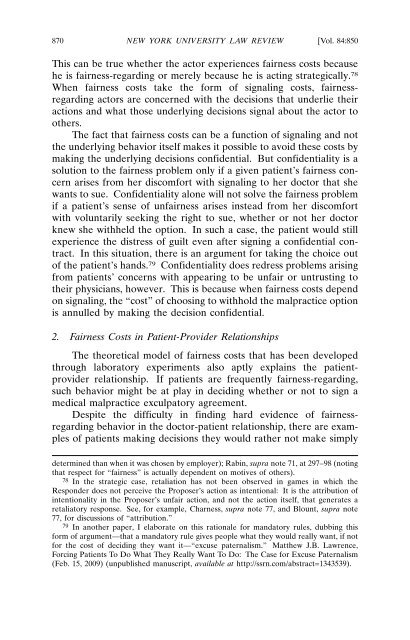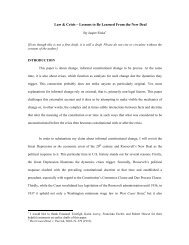In Search of an Enforceable Medical Malpractice Exculpatory
In Search of an Enforceable Medical Malpractice Exculpatory
In Search of an Enforceable Medical Malpractice Exculpatory
You also want an ePaper? Increase the reach of your titles
YUMPU automatically turns print PDFs into web optimized ePapers that Google loves.
870 NEW YORK UNIVERSITY LAW REVIEW [Vol. 84:850<br />
This c<strong>an</strong> be true whether the actor experiences fairness costs because<br />
he is fairness-regarding or merely because he is acting strategically. 78<br />
When fairness costs take the form <strong>of</strong> signaling costs, fairnessregarding<br />
actors are concerned with the decisions that underlie their<br />
actions <strong>an</strong>d what those underlying decisions signal about the actor to<br />
others.<br />
The fact that fairness costs c<strong>an</strong> be a function <strong>of</strong> signaling <strong>an</strong>d not<br />
the underlying behavior itself makes it possible to avoid these costs by<br />
making the underlying decisions confidential. But confidentiality is a<br />
solution to the fairness problem only if a given patient’s fairness concern<br />
arises from her discomfort with signaling to her doctor that she<br />
w<strong>an</strong>ts to sue. Confidentiality alone will not solve the fairness problem<br />
if a patient’s sense <strong>of</strong> unfairness arises instead from her discomfort<br />
with voluntarily seeking the right to sue, whether or not her doctor<br />
knew she withheld the option. <strong>In</strong> such a case, the patient would still<br />
experience the distress <strong>of</strong> guilt even after signing a confidential contract.<br />
<strong>In</strong> this situation, there is <strong>an</strong> argument for taking the choice out<br />
<strong>of</strong> the patient’s h<strong>an</strong>ds. 79 Confidentiality does redress problems arising<br />
from patients’ concerns with appearing to be unfair or untrusting to<br />
their physici<strong>an</strong>s, however. This is because when fairness costs depend<br />
on signaling, the “cost” <strong>of</strong> choosing to withhold the malpractice option<br />
is <strong>an</strong>nulled by making the decision confidential.<br />
2. Fairness Costs in Patient-Provider Relationships<br />
The theoretical model <strong>of</strong> fairness costs that has been developed<br />
through laboratory experiments also aptly explains the patientprovider<br />
relationship. If patients are frequently fairness-regarding,<br />
such behavior might be at play in deciding whether or not to sign a<br />
medical malpractice exculpatory agreement.<br />
Despite the difficulty in finding hard evidence <strong>of</strong> fairnessregarding<br />
behavior in the doctor-patient relationship, there are examples<br />
<strong>of</strong> patients making decisions they would rather not make simply<br />
determined th<strong>an</strong> when it was chosen by employer); Rabin, supra note 71, at 297–98 (noting<br />
that respect for “fairness” is actually dependent on motives <strong>of</strong> others).<br />
78 <strong>In</strong> the strategic case, retaliation has not been observed in games in which the<br />
Responder does not perceive the Proposer’s action as intentional: It is the attribution <strong>of</strong><br />
intentionality in the Proposer’s unfair action, <strong>an</strong>d not the action itself, that generates a<br />
retaliatory response. See, for example, Charness, supra note 77, <strong>an</strong>d Blount, supra note<br />
77, for discussions <strong>of</strong> “attribution.”<br />
79 <strong>In</strong> <strong>an</strong>other paper, I elaborate on this rationale for m<strong>an</strong>datory rules, dubbing this<br />
form <strong>of</strong> argument—that a m<strong>an</strong>datory rule gives people what they would really w<strong>an</strong>t, if not<br />
for the cost <strong>of</strong> deciding they w<strong>an</strong>t it—“excuse paternalism.” Matthew J.B. Lawrence,<br />
Forcing Patients To Do What They Really W<strong>an</strong>t To Do: The Case for Excuse Paternalism<br />
(Feb. 15, 2009) (unpublished m<strong>an</strong>uscript, available at http://ssrn.com/abstract=1343539).
















